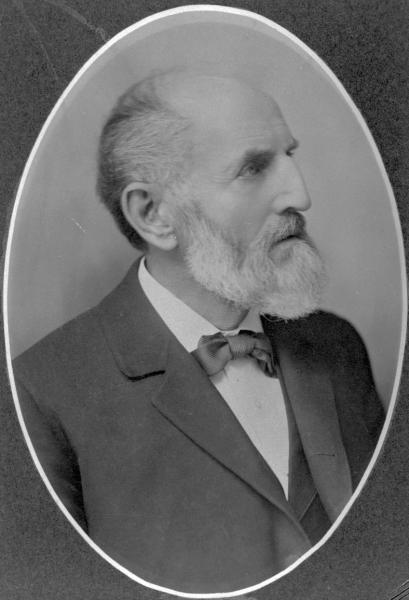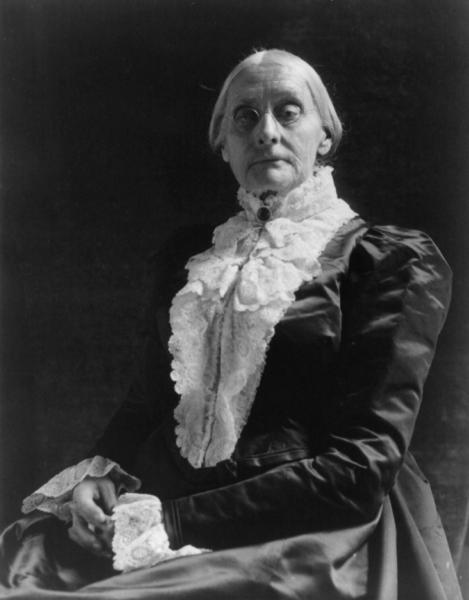By Claire Wolnisty, Angelo State University
Biographical information:
- Date of birth: August 22, 1824
- Place of birth: South Adams, Massachusetts
- Claim to fame: Abolitionist and women’s suffragist; newspaperman in Leavenworth, Kansas; leader of the New England Emigrant Aid Company; brother of Susan B. Anthony
- Political affiliations: Republican Party
- Date of death: November 12, 1904
- Place of death: Leavenworth, Kansas
- Final resting place: Mount Muncie Cemetery, Lansing, Kansas
Daniel R. Anthony was a man of strong abolitionist convictions who aggressively voiced his opinions as the postmaster, mayor, and dominant newspaper publisher in Leavenworth, Kansas. While Anthony’s contentious and radical nature isolated some of his contemporaries, he helped shape the territory of Kansas into a free state.
While growing up in Massachusetts, Anthony learned many of the values that he would later advocate in Kansas. Like his famous sister, Susan B. Anthony, Daniel supported abolitionism and the women’s suffrage movement for most of his life. After working as a teacher and as an insurance man in Massachusetts, Anthony moved to Kansas with the expressed purpose of fighting slavery in that territory.
He helped the Massachusetts Emigrant Aid Society establish Lawrence, Kansas, in 1854, but Anthony chose Leavenworth to be his home in June 1857. He quickly became a prominent and memorable citizen in “the most enterprising city in all Kansas” and was postmaster general of Leavenworth for close to 16 years. He also ran for mayor of his city a total of seven times, winning that position for three terms. Not satisfied with simply winning official public positions of authority, Anthony used his stations to foster the Underground Railroad in his town and to verbally and physically attack his proslavery enemies.
During the Civil War, Anthony spread his message of “putting down rebels” to the greatest number of people as a newspaperman in Leavenworth. He established his town’s newspaper, ironically named the Leavenworth Conservative, in 1861. The paper was a catalyst for Anthony’s stance that “we free every slave, every man of all nations, kindred[,] tongue[,] and color.”
Anthony fought his enemies with weapons as well as words. His volatile nature earned him a reputation as a man whose blood “boiled at a moment’s notice.” When the Kansas Herald’s R. C. Scatterlee accused Anthony of being a coward in 1861, Anthony shot Scatterlee dead in a street duel. Anthony took matters into his own hands and “ruined” Pleasant Hill, Missouri, by stealing away an estimated $150,000 worth of property and slaves from that town in January 1861. Rather than adhering to Union General Thomas Ewing’s decree of martial law in Leavenworth, Mayor Anthony ordered his citizens to burn Confederate-owned buildings in his town.
Read an 1861 letter describing Anthony’s raid on Pleasant Hill, Missouri.
Brigade Order no. 26 was Anthony’s main contribution to the antislavery cause as a member of the Union Army. The order prevented Southern men from passing through Union lines to search for their fugitive slaves. General Mitchell, Anthony’s superior officer in Tennessee, ordered him to redact the order since it predated Lincoln’s Emancipation Proclamation by six months. Rather than go back on his word, though, Anthony refused and was arrested. He returned to duty only after the U.S. Senate and General Henry Halleck investigated his case and had him acquitted.
At the close of the war, Anthony returned to Leavenworth to pursue his interest in newspapers. He bought the Leavenworth Bulletin and merged it with the Conservative. As the owner of the Leavenworth Times and the Commercial, Anthony had a monopoly on Leavenworth’s newspapers by 1876.
Much as before the outbreak of war, Anthony projected his views through his newspaper monopoly and in local elections, gaining him, according to Kansas resident Samuel Reynolds, “the most powerful enemies of any man in the state.” A. F. Collamore of the Kansas City Times labeled his opponent as “fearfully low down” and “utterly despicable.” Because Anthony was an outspoken critic of President Andrew Johnson’s conservative Reconstruction policies, he lost his position as postmaster. In May 1875, one of Anthony’s political enemies shot and almost killed him, and only a painstaking surgery saved his life. However, the strong opposition did not deter him from participating in local politics. He still served as a member of the Leavenworth city council and as the presiding officer of the Republican State Convention.
Anthony’s enemies may have called him “fiendish” and “bloodthirsty,” but they could not find fault with his dedication to his state.
Anthony’s enemies may have called him “fiendish” and “bloodthirsty,” but they could not find fault with his dedication to his state. He became one of the founders and lifelong members of the Kansas State Historical Society. When Kansas was admitted to the Union as a free state, it was Anthony who spread the news to the rest of his state. As Anthony wrote in his own epitaph, “He helped to make Kansas a free state. He fought to save the Union. He published the Daily Times for nearly forty years in the interest of Leavenworth. He was no hypocrite.” Today, the Leavenworth Times remains the oldest newspaper in Kansas.
Suggested Reading:
fp>Connelley, William E. A Standard History of Kansas and Kansans. Vol. 1-5. Chicago: Lewis Publishing Co., 1918. Transcribed by Carolyn Ward, 1998.
fp>Howes, Cecil. "Pistol Packin' Pencil Pushers." Kansas Historical Quarterly 12, no. 2 (May 1944): 116-138.
Cite This Page:
Wolnisty, Claire. "Anthony, Daniel Read" Civil War on the Western Border: The Missouri-Kansas Conflict, 1854-1865. The Kansas City Public Library. Accessed Tuesday, April 23, 2024 - 21:38 at https://civilwaronthewesternborder.org/encyclopedia/anthony-daniel-read



